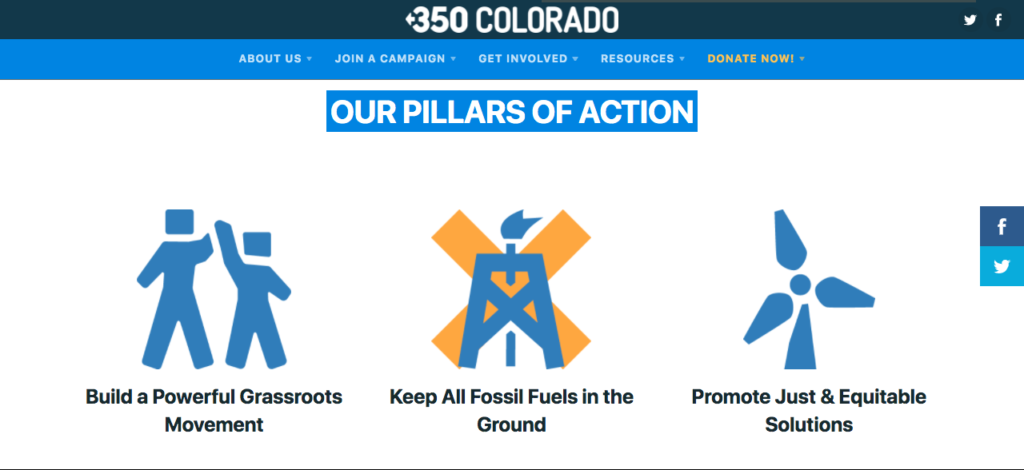A report released last Tuesday by the environmental group 350 Colorado found that 70% of the state’s greenhouse gas (GHG) emissions stem from the oil and gas industry.
The report raises questions about Colorado’s newly released emissions reduction roadmap, approved by Gov. Jared Polis (D-CO), which estimated that oil and gas are responsible for just 17.3% of the state’s emissions.
The 350 Colorado report recommended numerous improvements to Polis’ proposed climate plan, which the environmental group said severely underestimated the impact of oil-and-gas emissions in the state. Polis released the final version of his plan last Thursday, two days after 350 Colorado released its report.
“We have analyzed the updated roadmap and found that nothing has changed basically as far as our report stated,” said Micah Parkin, 350 Colorado’s Executive Director.
GHG emissions from oil and gas operations — especially from methane leaks — are a significant contributor to climate change.
Polis’ roadmap, created in partnership with Colorado’s General Assembly and state climate and energy officials, focuses on investing in renewable energy and preventing methane leakage.
“Colorado’s Greenhouse Gas Pollution Reduction Roadmap marks a momentous step towards the state’s goal of achieving 100% renewable energy by 2040,” said Polis in a statement. “This roadmap illustrates how Colorado can work to mitigate the climate challenges we are already facing to build a better future for all Coloradans. Colorado’s plan is ambitious but achievable.”
350 Colorado’s report, titled “Avoiding a Roadmap to Climate Catastrophe,” concluded that the plan needs to be more ambitious with its goals and policy proposals.
Thus, the report called for a 10% per year reduction in emissions culminating in a full phase-out of oil and gas production in Colorado by 2030. While 350 Colorado wanted to completely eliminate oil and gas production in ten years, Polis’ goal is to halve emissions by then.
“Of great concern to many state climate leaders is that the state is greatly underestimating the actual GHG emissions from the oil and gas sector and overestimating future reductions in GHG emissions from this sector that can be achieved,” the report reads. “This results in Roadmap projections that assume Colorado can greatly increase oil and gas production while meeting our GHG emission reduction goals. Faulty assumptions result in faulty outcomes.”
The 350 Colorado report found that Polis’ roadmap actually allows for an 86% increase in oil production and a 41% increase in gas production by 2030 largely because of its estimation for methane leakage rates.
The state assumes that methane leakage, a byproduct of oil and gas drilling, can be prevented with improvements in technology which would decrease the emissions from oil and gas. But 350 Colorado pointed out that the methane leakage rates used in the roadmap — rates self-reported by the oil and gas industry — were unrealistically low and the estimations for how much the state can reduce that leakage were unrealistically high.

Colorado’s Air Quality Control Commission, also involved with the creation of the state’s emissions roadmap, is set to take up a rule in February that would require the installation of technology that limits methane leakage at all new oil and gas projects as well as at existing sites in the process of being upgraded.
To reliably assess how much methane leakage there is at a site, Parkin believes the state should measure leakage rates itself, rather than relying on industry estimates.
“The state is still using favorable emissions factors to do calculations and it’s possible that our leakage emissions are really that low. But until we get the actual monitoring in place we feel that it would be best to be more protective in our projections, rather than best-case scenario,” Parkin said. “It would be great if we really did have lower leakage rates, then we will have to deal with the actual burning of these fuels.”
Other issues cited by 350 Colorado included the state roadmap using outdated global warming projections and ignoring emissions of oil and gas produced in Colorado but exported out of state.
“In the updated report, the state has not addressed the export emissions that we are so concerned about. They’ve continued to turn a blind eye towards it,” Parkin said. “If we are really going to do our part as a state to address the climate crisis ultimately we are going to have to take into consideration and take responsibility for the oil and gas we produce even if it’s exported elsewhere.”
Parkin emphasized the importance of using the best practices in climate science methods when making goals of this importance.
“If Colorado truly wants to lead in global efforts to solve the climate crisis, our state must begin with an honest and accurate accounting of Colorado’s actual GHG emissions resulting from the oil and gas sector and use that to guide policy decisions,” Parkin said.
The conclusion that the oil and gas industry contributes to 70 percent of Colorado’s GHG emissions is under dispute, according to this article by the Colorado Sun. State air quality regulators and representatives for the Colorado Oil and Gas Association (COGA) say that 350 Colorado used numbers in their calculations that portrayed the worst-case scenario in order to further their agenda, stated on their website to “keep all fossil fuels in the ground.”
350 Colorado was involved in a similar environmental fight in December in Boulder. The group convinced the Boulder County Board of Commissioners to require oil and gas drilling sites to be set back 2,500 feet from schools, homes, public trails, offices, and childcare facilities. In an article published by industry media outlet Natural Gas Intelligence COGA representatives also questioned 350 Colorado’s scientific process.
Other environmental groups wanted to see more concrete actions the state will make to ensure that environmental justice is equitably moving forward in Polis’ plan, especially considering those most affected by climate change in the U.S. are already marginalized communities. Polis’ office did not return a request for comment about the roadmap. 350 Colorado is planning on sending a letter next week to Polis’ office requesting modifications to be made to the state GHG emissions reduction roadmap. The letter currently has currently been signed by 50 environmental organizations, both local and statewide.



